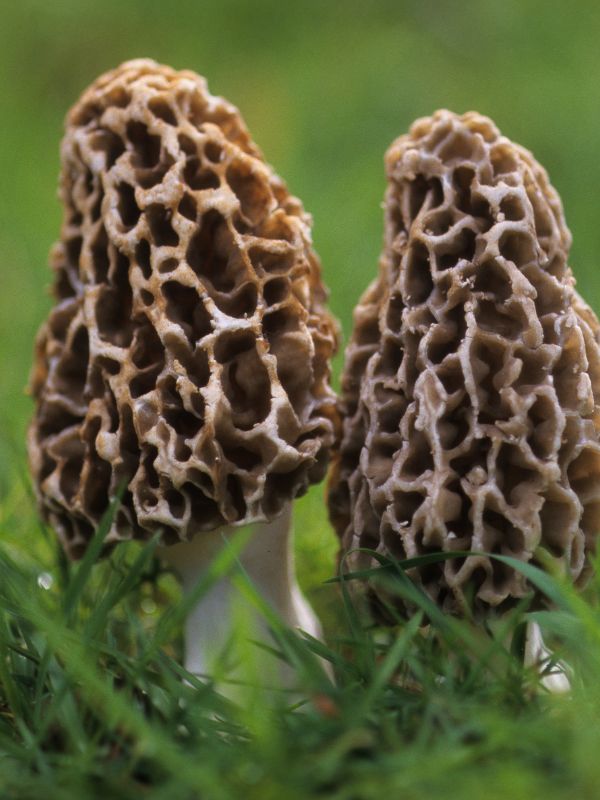The Morel mushroom (Morchella spp.) is a springtime delicacy beloved by chefs and foragers alike.
Known for their earthy, nutty flavor and unique honeycomb-like caps, these wild mushrooms offer more than just gourmet appeal; they’re packed with nutrients and health benefits.
Rich in vitamins D and B-complex, essential minerals like copper and potassium, and bioactive compounds, morels support immunity, digestion, and even bone health.
#1. Boosts Immune Function
Morel mushrooms are rich in antioxidants such as polysaccharides and phenolic compounds, which support immune system health.
A 2019 study published in Food Research International found that extracts from Morchella spp. enhanced the activity of white blood cells, strengthening the body’s defense against infections.
By incorporating morels into your diet, you can potentially bolster your immune system and reduce the risk of seasonal illnesses.

#2. Supports Bone Health
Vitamin D is crucial for calcium absorption and maintaining strong bones.
Morels contain around 206 IU of vitamin D per 100 grams, making them an excellent natural source of this essential nutrient, especially for individuals with limited sun exposure.
For example, a 2017 study in the Journal of Nutrition emphasized the importance of vitamin D-rich foods in preventing osteoporosis and maintaining skeletal strength.

#3. Promotes Digestive Health
Morels are a good source of dietary fiber, which promotes gut motility and nourishes beneficial gut bacteria.
Their fiber content can help prevent constipation and support overall digestive wellness.
Additionally, their low-calorie profile (about 31 calories per 100 grams) makes them an ideal choice for a gut-healthy, weight-conscious diet.

#4. Enhances Skin Health
The antioxidants in morels, such as selenium and copper, combat free radical damage and support skin elasticity.
Copper, an essential trace mineral in morels, plays a vital role in the production of collagen, which keeps skin firm and youthful.
Regular consumption may lead to a noticeable improvement in skin texture and radiance.

#5. Supports Weight Management
Low in calories but rich in protein and fiber, morels are a satisfying addition to meals, helping to curb hunger and reduce overeating.
Their nutrient density ensures that you’re nourished while maintaining a calorie deficit for weight loss goals.
This balance makes morels a smart choice for healthy, sustainable weight management.

#6. Reduces Inflammation
Morels contain bioactive compounds with anti-inflammatory properties, such as polysaccharides and phenols.
A 2020 study in Mycology Research noted that extracts from Morchella spp. reduced inflammation markers in lab tests, suggesting potential benefits for conditions like arthritis or inflammatory bowel disease.

#7. Boosts Energy Levels
Morels are high in B-complex vitamins, including riboflavin (B2) and niacin (B3), which are essential for energy metabolism.
These vitamins help convert food into usable energy, reducing fatigue and enhancing mental clarity.
Incorporating morels into your diet can support an active, energetic lifestyle.

#8. May Have Anticancer Properties
Preliminary research indicates that polysaccharides in morels may inhibit the growth of certain cancer cells.
A study published in International Immunopharmacology in 2018 highlighted the potential antitumor activity of compounds found in Morchella spp., though more human trials are needed.
Including morels in a balanced diet could provide additional protective effects against cellular damage.

How to Use Morel Mushrooms
1. Cooking Instructions
Cooking is essential for safe consumption as raw morels contain hydrazine toxins.
You should sauté, fry, or simmer morels for at least 15 minutes to neutralize these toxins and enhance their natural flavors.

2. Cleaning the Mushrooms
Gently brush off dirt or debris with a soft brush. If rinsing, do so quickly under cold water to avoid over-soaking, as morels are highly porous.
3. Incorporating into Recipes
- In soups and stews: Add morels to vegetable or meat-based soups for a rich, earthy flavor.
- In sautés: Sauté morels with garlic, onions, and butter for a simple, flavorful side dish.
- In pasta or risotto: Toss cooked morels into creamy pasta dishes or risottos for a gourmet touch.

4. Storage Options
Fresh morels can be refrigerated and should be used within a few days.
For long-term storage, dry them using a dehydrator or store them in the freezer after blanching.
Cautions and Precautions
Raw morels contain hydrazine toxins that can cause stomach upset. Cooking is essential to neutralize these toxins.
Introduce morels gradually into your diet to ensure you don’t have an allergic reaction. Common symptoms of mushroom allergies include nausea or skin rashes.
Be cautious of false morels (Gyromitra spp.), which can be toxic. Always consult a guide or expert when foraging, as true morels have hollow stems, whereas false morels do not.
Disclaimer
This article is intended for informational purposes only and does not replace professional advice.
Always consult a healthcare provider before making significant dietary changes, and seek expert guidance when foraging wild mushrooms.

Unlocking the Secrets of Morel Mushrooms: Benefits You Need to Know
